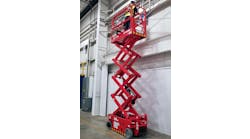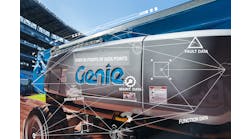In RER’s July issue, we interviewed software providers about how the cloud computing concept continues to penetrate the rental industry, and we will be reprinting them in the coming weeks in RER Reports. In this interview, Michael Saint, president, Corporate Services, talks to RER managing editor Brandey Smith about the critical nature of customer support, the necessity of integrating software and why it should be scalable.
RER: The cloud computing concept has steadily grown as its benefits become more apparent to businesses and individuals alike. Do you think the popular release of Apple’s iCloud will further enhance awareness of the cloud computing concept and make offsite storage of data more comfortable for rental business owners?
Saint: If your question had not been specific to Apple, I would have said yes, but Apple has a history of being a poor provider to business with the exception of those engaged in graphic design and photography.
Does Apple’s iCloud offering mean that smaller rental businesses with fewer locations will soon be best served by utilizing a similar cloud model for their software implementation and data storage?
So many different "cloud" providers currently exist that anyone interested in "cloud computing" has many choices. Those in the rental business will not find a home with Apple because no rental software currently exists (to my knowledge) that runs on Apple platforms. Apple devices like "Macs" and "iPads" can be used as terminal devices only.
Explain how all the outside data management that the cloud provides will affect a rental business’ IT costs.
It may offer cost savings to rental businesses that are large enough currently that they employ IT personnel. Most small rental businesses rely on contractors to provide these services on an "as needed" basis and as a result it is doubtful that any significant savings are possible.
Many rental management solutions providers tout their superior customer support capabilities. How important is customer support to consider when selecting a new software provider? Give me an example of a situation when support was invaluable.
In my opinion the answer is the same as: How important is it for you to open your doors for business?
There are two aspects of support. First is the emergency response and the second is the constant maintenance of the software.
Most rental businesses today depend on their software solution to answer questions like "is equipment available; is the customer qualified to rent; etc.” Despite the increased reliability of both hardware and software, the fact remains that failures occur. Rarely are the users knowledgeable enough to diagnose the cause and take corrective action required to correct the situation. Failure could result in loss of revenue and even loss of customers. The software provider must provide support during the same hours that the rental company operates. The software provider should also be willing to install new systems and updates in non-working hours and weekends to prevent interruption of service by the rental company.
The implementation of a software solution in the rental business is a major event no matter the solution. Rental operators should not need to replace their software each time something changes in the market place like a new version of Windows or a change in their hardware. A solid support agreement can allow the rental operator to install and utilize the same software for many years without interruption or major expense.
Describe the very latest technologies that rental businesses are benefiting from both in terms of hardware equipment/devices and software features. What do you see coming?
In the early days of computing there were less than a dozen providers of computer equipment. Once you chose a supplier, then the only source of software and peripherals was that provider. If your provider did not offer what you needed it was tough luck and virtually no inter-operability existed with other computers or other devices.
Today, the market has changed dramatically with virtually unlimited choices for hardware, software and services. Today, integration is the key because no single company can provide everything their customers may require. The rental software must be able to integrate to other software and services to meet the requirements of the industry.
For example, a rental company serving all states of the U.S. will find it a daunting task to keep up with changes in sales taxes throughout the country, but if their rental software can integrate with services like Vertex, AfaTax and CCH the issue is resolved at substantial cost savings compared to the employees necessary to remain compliant.
Keeping track of the exact location of equipment, especially if stolen, can be important to every rental business. Today there are hundreds of suppliers of GPS services that allow rental operators to not only track the location of equipment but in some cases also receive data like meter hours to allow the rental operator to schedule service and to bill their customer for usage of the equipment. Again, the ability of the rental software to integrate with these services offers many economic benefits to the rental operator.
Today the ability to communicate with customer and vendors quickly, effortlessly and precisely can dramatically impact the performance and profitability of the rental operator. Waiting of the post office is no longer an option. The rental software of today must be capable of communicating through a vast number of electronic methods including email, EDI, XML, etc. The good news is that these methods are no longer considered exotic, but have become part of the daily life in the rental business.
The rental business is a mobile business where business is conducted in the field. The ability of the user to use mobile devices like tablet computers and smartphones can be critical. Today, there are hundreds of these devices offered and the rental software must accommodate their use.
Explain how software is developed so that it not only meets a rental company’s current business needs, but is equipped to grow as the business continues to grow.
The key here is to design the software without features in mind, but to build a framework that allows features to be added and user preferences that allow users to turn on or off features that are useful. The design must expect that over time as business needs change, that new features will be routinely added to meet the new requirements.
Secondly, the software should not attempt to make compromises to allow it to be everything to everyone. Its goal should be to be the best of breed rental software then allow the software to integrate with new devices and services as they become available and useful to each rental operator. The rental operator should be free to choose the best choices for the businesses. The software should be able to run locally or in the cloud. It should integrate with the rental operator's choice of (for example) financial software, tax services, GPS services and peripheral devices.
It should be scalable. The software should be built on a foundation that can be offered to a small startup company but yet grow through the use of faster and larger hardware, databases, etc.
What advice would you give to rental businesses that are still using relatively out-of-date legacy software systems that don’t offer the latest integrations and efficiencies?
The computer / software marketplace is changing at an incredible pace. Technology is available today that we could only dream about just a few years ago. Every business decision should offer a favorable cost/benefit ratio, so making a change for no other reason than changing is not a recommended course.
Don't remain stagnant. Remember that your customers are changing and if you fail to change with them you risk becoming obsolete in their minds. Our recommendation is to attempt to remain knowledgeable about the changes and what opportunities the changes might offer you.
1) Read articles on the subject.
2) Talk to your peers about the changes they are making.
3) Talk to your business advisors (accountants, lawyers, insurance agents and other advisors) about changes that you might consider.





